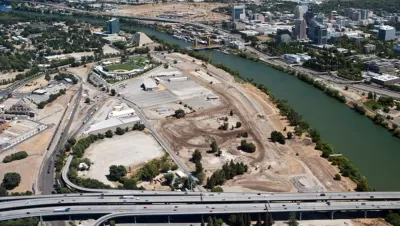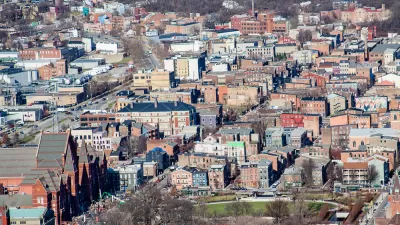CityLab University explains a controversial and misunderstood funding mechanism.

Benjamin Schneider writes a CityLab University explainer for Tax Increment Financing(TIF), a controversial revenue generation mechanism implemented in some parts of the country in various forms.
This mechanism for financing redevelopment is a powerful and controversial force in American urbanism. Every state except Arizona currently allows it, as does the District of Columbia, and it has become the most popular incentive tool for economic development in the United States as the federal government has decreased its urban development spending. TIF plays a role in megaprojects such as Chicago’s Lincoln Yards and Amazon’s HQ2 in Arlington, Virginia, as well as in smaller-scale neighborhood improvements, affordable housing, and transit projects.
Schneider also notes the controversy and debate surrounding TIF:
Depending on the specific project, and whom you ask about it, TIF is an essential mechanism for cities to stimulate much-needed economic development and revitalize neighborhoods at no cost to taxpayers, or it’s an opaque developer giveaway that puts a strain on city services without providing much public benefit.
The article includes a lot more detail by way of illuminating the concept. For additional reading after completing the CityLab article, see also a reference to a recent case study in Vermont and a report written about Tax Increment Financing by the Lincoln Institute of Land Policy in September 2018.
FULL STORY: CityLab University: Tax Increment Financing

Planetizen Federal Action Tracker
A weekly monitor of how Trump’s orders and actions are impacting planners and planning in America.

Restaurant Patios Were a Pandemic Win — Why Were They so Hard to Keep?
Social distancing requirements and changes in travel patterns prompted cities to pilot new uses for street and sidewalk space. Then it got complicated.

Map: Where Senate Republicans Want to Sell Your Public Lands
For public land advocates, the Senate Republicans’ proposal to sell millions of acres of public land in the West is “the biggest fight of their careers.”

Maui's Vacation Rental Debate Turns Ugly
Verbal attacks, misinformation campaigns and fistfights plague a high-stakes debate to convert thousands of vacation rentals into long-term housing.

San Francisco Suspends Traffic Calming Amidst Record Deaths
Citing “a challenging fiscal landscape,” the city will cease the program on the heels of 42 traffic deaths, including 24 pedestrians.

California Homeless Arrests, Citations Spike After Ruling
An investigation reveals that anti-homeless actions increased up to 500% after Grants Pass v. Johnson — even in cities claiming no policy change.
Urban Design for Planners 1: Software Tools
This six-course series explores essential urban design concepts using open source software and equips planners with the tools they need to participate fully in the urban design process.
Planning for Universal Design
Learn the tools for implementing Universal Design in planning regulations.
Heyer Gruel & Associates PA
JM Goldson LLC
Custer County Colorado
City of Camden Redevelopment Agency
City of Astoria
Transportation Research & Education Center (TREC) at Portland State University
Camden Redevelopment Agency
City of Claremont
Municipality of Princeton (NJ)





























